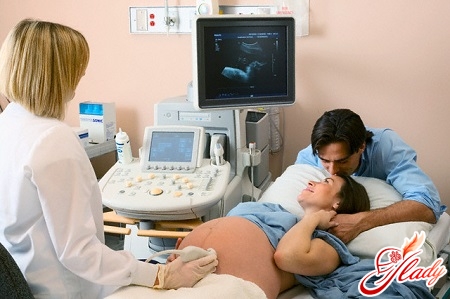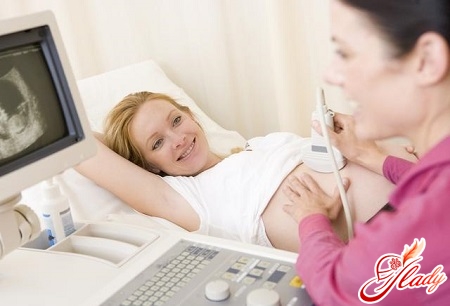
Periods during pregnancy -another myth or pathology associated with women's health problems? For many, there is a persistent stereotype that it is the absence of menstruation that is a sign of a woman's possible pregnancy. But here we see a completely opposite phenomenon, when menstruation may occur, and at the same time, incomprehensible processes in the body are observed for such a case. And how perplexed a woman is when she is told at a doctor's appointment that she is pregnant and is in the second or even third month of pregnancy. This is on the one hand. On the other hand, if the pregnancy is planned and a woman has menstruation during pregnancy, then this cannot but cause anxiety in her. To what extent does such a phenomenon threaten the fetus and the woman's health? Is this a real problem or nothing special - a commonplace occurrence? We will talk about this and other things below.
Menstruation during pregnancy - myth or reality?
Before we get into the very nature of thisphenomena such as menstruation during pregnancy, it is necessary to say that it occurs in 10-20% of expectant mothers. What is this connected with? With different studies of the nature of menstruation during pregnancy and different approaches. For example, if only weak and moderate bleeding were taken into account, then according to statistics such phenomena were observed in every 5th pregnant woman. If only strong and moderate bleeding were taken into account, then statistics showed the presence of such processes in every 10th pregnant woman. The different approach to accounting is explained by the fact that weak bleeding that occurs in expectant mothers, moreover, if it bothers them extremely rarely, is accepted by doctors as the norm. Such processes, as discussed above, occur in every 5th expectant mother and manifest themselves during the first 3 months of pregnancy. And if menstruation can cause panic and anxiety in the expectant mother, then such a phenomenon cannot outrage an experienced doctor. At least until the pregnant woman is examined and tested. And the stories that the entire pregnancy was spent with menstruation may be completely true, but only partially. The fact is that such bleeding is not a sign or accompanying element of menstruation, since the latter phenomenon in its full sense cannot occur in a pregnant woman. So what is it?
Physiology of menstruation
In order to understand the cause of occurrencethe above processes, it is necessary to analyze and determine what the menstruation process is. Menstruation is understood as a part of the menstrual cycle in a woman, during which the uterus rejects the mucous membrane. Otherwise, this layer is called the endometrium. The phenomenon of rejection itself causes bleeding in a woman. Bleeding in a woman during menstruation is caused by the following reason. The mentioned mucous membrane, which covers the walls of the uterus, is penetrated by many blood vessels that provide it with excellent blood supply. When the monthly cycle occurs, as well as other processes in the ovaries, the mucous membrane reacts extremely sensitively to them. Specialists associate such sensitivity directly with female hormones. Thus, it has been established that when the follicle increases, this is accompanied by the release of estrogen. In turn, estrogen stimulates the process of increasing the inner lining of the uterus in size. During ovulation, the corpus luteum is formed, which replaces the follicle. This process is associated with such a female hormone as progesterone. This female hormone, progesterone, promotes the accumulation of useful substances in the mucous membrane (endometrium). Simultaneously with such accumulation, this hormone prepares this membrane to accept a fertilized egg. But if the egg is not fertilized, after some time, calculated in several weeks, the female body stops producing progesterone simultaneously with the cessation of the work of the corpus luteum. As soon as the amount of this hormone decreases, the mucous membrane atrophies and exfoliates. At the same time, blood vessels are exposed and injured. As a result, part of the mucous membrane, its fragments, mucus and blood of these exposed vessels form menstrual blood. Many women have noticed that their menstrual blood is somewhat different from ordinary blood. Now it is clear why. In the event that the egg is fertilized, the corpus luteum retains its activity. This activity continues during the first 3 months of pregnancy. This means that during this period the female body continues to produce the hormone progesterone, which ensures the preservation of pregnancy at this time. Since the fertilization of the egg by the sperm occurs, the process of rejection of the endometrium does not occur. The mucous membrane is not rejected precisely because the woman is pregnant. If a woman experiences bleeding under such conditions, this is in no way a period in the literal sense of the word. We are talking about a possible rejection of the mucous membrane and, as an undesirable option, termination of pregnancy. It is for this reason that if a woman is pregnant and her period appears, she must immediately consult a doctor. In such a situation, there is no point in thinking about the miraculous properties of your body. There are absolutely no reasons for joyful surprise.
Causes of monthly onset of pregnancy
So, bleeding during pregnancy is notis a sign of menstruation or its manifestation. As stated above, the cause of bleeding may be that the process of rejection of the mucous membrane (endometrium) occurs and as a result of this process the pregnancy is interrupted. But this is not the only reason why the so-called menstruation may begin in pregnant women.
When there is no cause for concern?
The reason for the scanty, short-termBleeding in a pregnant woman may be due to the fact that a fertilized egg was correctly implanted through the uterine wall. As a result of such implantation, bleeding may occur, which is mistaken for menstruation. Such discharge does not pose a threat to the development of pregnancy, and due to its short duration, scantiness and painlessness, it does not cause the woman the troubles that she experiences during traditional critical days. In this case, it should be noted that the discharge will appear in the form of several blood droplets that the expectant mother can notice on her underwear and which appear extremely rarely. If the discharge does not correspond to such signs, then we are talking about a different case and other reasons. Another reason for such menstruation is hormonal changes. The body of a pregnant woman can bleed during periods in which menstruation should occur if there was no pregnancy. Such discharge is quite moderate, is not accompanied by pain in the lower abdomen, and in the absence of other problems does not pose a threat of miscarriage. The next reason for the occurrence of discharge during pregnancy is associated with a low level of hormones synthesized by the placenta. Such bleeding is possible in the first, early stages of pregnancy and does not pose a danger to the fetus and the woman. But even in this, at first glance, harmless case, it is necessary to consult a doctor. In conclusion, it is necessary to especially emphasize: as soon as a pregnant woman notices bloody discharge resembling menstruation, she should immediately consult a doctor. Regardless of the period of the fetus being carried, the nature of such discharge should be explained by a specialist doctor, and not a friend, mother or midwife. The human body is complex enough to look for simple explanations for the complex processes occurring in it. All the admonitions of the close environment that bleeding during gestation is a fairly common phenomenon should not be taken into account by the expectant mother. It is quite possible that at this stage such discharge is not a reason to worry, and there are women who, having such phenomena, successfully carried the fetus and gave birth to healthy babies. But why hope for a favorable outcome if there is an opportunity to get a conclusion, and if necessary, help from a qualified specialist? Or is there a desire to risk your health and the health of the fetus due to carelessness? This is a rhetorical question.
Periods in pregnant women - a cause for concern
It was mentioned above that bleedingpregnant women are if not a cause for concern, then certainly require immediate medical attention. It is very good if the expectant mother's discharge is not an alarming symptom. But it is important to know that, according to statistics, the majority of miscarriages, up to 80%, occur during the first 3 months of pregnancy (on the days when the woman had her period before she began to bear the fetus). Among medical specialists in this area, it is believed that any discharge during this period is a serious sign that there is a risk of miscarriage. It is for this reason that doctors insist that with any discharge in pregnant women, they are obliged to urgently seek medical advice and an examination. Such demands of doctors can be attributed to the phenomenon of overcaution. Many have encountered the fact that the prescribed treatment associated with staying at home or in a cast, release from active movements, is somewhat with a reserve. But this opinion is largely subjective, since what a specialist sees and the practice he has undergone is not available to an outsider, who has fragmentary information from a 9th-grade anatomy textbook in his head. Doctors' opinions may differ among themselves. It was stated above that menstruation during pregnancy can occur for various natural reasons. If the expectant mother's hormonal background has not had time to adjust, its changes are delayed in relation to the processes that occur inside her body (we are talking about the appearance of the fetus), then she may well observe scanty discharge that does not cause painful sensations. But such manifestations are allowed in the first month of gestation and are considered quite acceptable. If these phenomena occur in the second month of gestation, then this is a rather alarming symptom. An alarming symptom precisely so that the doctor begins a serious examination of the expectant mother. But if there are known cases where menstruation is allowed in pregnant women, is there a need to consult a doctor in all cases without exception? There is such a need. By mistakenly considering blood discharge as a normal process occurring inside due to some forgetfulness of the body or inadequate reaction of hormones, one may not notice the development of undesirable phenomena. For example, such carelessness may cause infectious diseases or inflammatory processes of the internal genital organs to go unnoticed. "Pranks" of hormones can be harmless, causing no harm to the health of either the fetus or its mother. But serious pathological hormonal changes can occur, for the prevention of which the help of a doctor is needed. Bleeding can be a sign of internal injuries or indicate placental abruption. If there is a problem with the fetus being carried (for example, the ovum is detached) or other pathologies of its development, one of the signs of this is bleeding. Medical care in such cases is required immediately.
Threatening hormonal changes
As mentioned above, during pregnancy it maythere is a violation of the secretion of such a hormone as progesterone, when the female body secretes it insufficiently. As a result of its insufficient secretion, the uterus can reject the fetus. If the cause of the discharge is recognized in time in this case, the doctor prescribes medications that replace this hormone and prevent the occurrence of the process of rejection of the fetus. Otherwise, when a drug effect on the actions of the hormone in a pregnant woman is required, she has an increased level of male hormones. This phenomenon is called hyperandrogenism, as a result of which the fertilized egg can peel off, which leads to an inevitable miscarriage. One of the causes of hyperandrogenism is bleeding. The next case is that the development of the fetus occurs outside the uterine cavity. Otherwise, this phenomenon is called an ectopic pregnancy. An ectopic pregnancy can only be detected with the help of qualified medical care. But its signs, for which a woman needs to immediately contact a doctor, are very severe pain, which is accompanied by profuse bleeding from the vagina. Subsequently, such discharge becomes more and more prolonged. In cases where a pregnant woman is diagnosed with fibroids or endometriosis, there is a high probability that the attachment of the fetus was unsuccessful. This means that the fetus will be poorly supplied with oxygen, serious problems will arise with its development and, as a result, the fetus will be lost. The primary signs of such a process are the so-called menstruation during pregnancy. Do not think that such discharge is possible only in the early stages of gestation. When the fetus is up to 7-8 months old, the placenta can block the entrance to the cervix due to its low location. This phenomenon can be observed in women who have previously terminated a pregnancy or given birth by cesarean section. Bloody discharge in such women indicates placenta previa. If a woman is carrying 2 fetuses, then menstruation during pregnancy may indicate that one of the embryos is being rejected due to various circumstances. Despite this, the second embryo can develop quite normally, without pathologies.
Correct behavior: what should I do?
As you can see, the description of the above processes,which can occur in the body of a pregnant woman are very different. Their primary symptoms in the form of bloody discharge can manifest themselves equally in those who do not need to worry about their health and the health of the fetus, and in those who need immediate medical care. The most universal advice that must be given to all expectant mothers and which suggests itself is that if the expectant mother discovers that she has her period, she must immediately consult a doctor. This will prevent any undesirable processes that lead to deterioration in the health of the pregnant woman and termination of pregnancy. Good health and happy motherhood to you!









